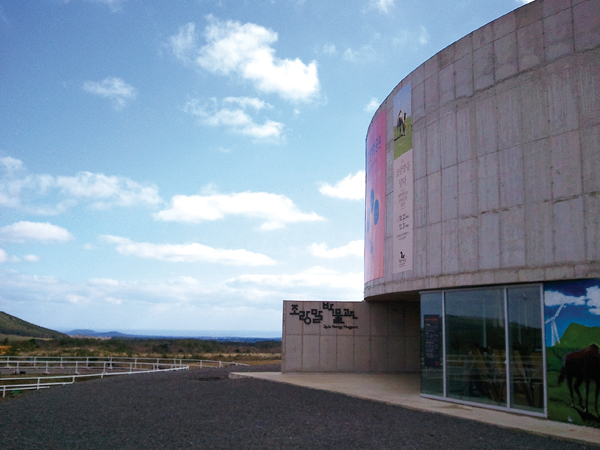
- Updated 2024.4.16 17:33
- All Articles
-
member
icon
-
facebook
cursor
-
twitter
cursor
|
| |
 |
|
| ▲ The entrance to the Horse Museum in Gasi Village. Photo by Anne Hilty |
Gasi Village is undergoing a makeover.
The recipient of funding from two nationwide programs for the revitalization of villages, this sleepy hamlet near Pyoseon has been integrating art and cultural heritage features for the past several years.
The New Village Movement, began in 1970, was a decade-long attempt to modernize the rural economy in Korea. One of the collateral costs of that initiative was an erosion of cultural heritage, which has yet to fully recover. In an attempt to rebuild and revitalize such heritage, the national government today funds rural community programs, drawing from historic and cultural references.
The Project for Rural Village Development and the Agri-Food Villages Project were both initiated in Gasi Village around 2009. Other villages suggested that Gasi had ‘won the lottery,’ as the two projects seemed to arrive simultaneously; however, the sudden infusion of cash was actually the result of separate applications and was less than that received by other villages, albeit over a shorter time period.
As a result of this endeavor, there are many cultural events and activities in the village: art galleries and other culturally oriented public spaces, nature trails, eco-friendly practices such as energy produced by wind turbine or the oil of the canola flower, and much more. The village has become a case study for many, with an estimated 1000+ researchers visiting annually, and may become a model for village rehabilitation projects.
An art residency program has also been established, which invites two artists at a time, one local and another international, for a 6-month stay. They become involved in various village projects as well as the development of their own artwork. Funded at the national level, it has been offered for 2 years thus far.
There are two trekking paths: the 14.4k Gasi Village Cultural Trail, which encircles the village and highlights a number of historically significant sites, and the 20k Horseherd Trail, which includes both Ddarabi and Keun Saseum-i oreums (volcanic cones, conducive to hiking) as well as the new Horse Museum.
A significant aspect of the village’s history can be found in its pastures. During the Joseon Dynasty, herds of horses were raised and kept in this region of Jeju, trained for military use and ultimately sent to the regency in the mainland as needed. Though islanders have a long relationship with horses, stemming from the 13th century when Mongols occupied Jeju, the horse has also always represented hardship and obligation: first to the Mongolian warriors, and later to the Joseon kings.
The Horse Museum, managed by local cultural organization Ieodo-Sana under the direction of former Seoulite and cultural activist / policymaker Ji Geum Jong, offers a comprehensive history of the horse’s significance in Jeju culture as well as rotating art exhibits. On the grounds, one can also engage in horseback riding and feeding, camp out complete with campfire or stay in a Mongol ger (tent) guesthouse. Numerous other activities are in development at this time.
Private initiatives have also arisen which reflect the village’s revitalization and focus on ecologically sound and culturally based practices. One such innovative project can be seen in ‘Gyuljip,’ or Tangerine House, a guesthouse and public space communally owned by 20 investors primarily from Seoul. The eco-friendly design and building was largely undertaken by members of Yonsei University’s “Seoul Youth Factory for Alternative Culture,” aka “Haja Center,” under the guidance of its founder, renowned scholar Cho Han Hae Joang, one of the investors of Tangerine House.
What renders this endeavor unique is its ultimate purpose of “idea-gathering, incubating, and cultivating social change,” according to Ji who is also an investor; Tangerine House rests on his property. Other members include the former director of the Korea Art Foundation Council, doctors, scholars, and the like, all sharing progressive ideals.
Gasi residents seem “very satisfied and supportive” of the changes to their village, according to Ji, who has worked alongside the village council throughout the revitalization process. Although he also acknowledges that there are special-interest groups who have generated some resistance and even unfounded rumors at times, as well as others who are indifferent and thus not participating, he feels that residents ultimately understand that this infusion of new blood into village life is meant to counteract the significant loss of Jeju’s youth to the mainland and beyond.
“Numerous villages in Japan have been lost,” Ji recounted, “due to loss of youth and the aging of their remaining residents, and a similar process is happening throughout Korea. This type of project aims to counteract that, to encourage youth to return, to rebuild a social and cultural base and quality of life.”
Dr. Hilty is a cultural health psychologist from New York who now makes Jeju Island her home. In full disclosure, she is a researcher with Ieodo-sana, the cultural organization mentioned in this article. |
|
|
|
|
|
|
|
|
|
|
ⓒ Jeju Weekly 2009 (http://www.jejuweekly.net)
All materials on this site are protected under the Korean Copyright Law and may not be reproduced, distributed, transmitted, displayed, published without the prior consent of Jeju Weekly. |
|
|
|
|
| Jeju-Asia's No.1 for Cruise |
|
|
|
Title:The jeju Weekly(제주위클리) | Mail to editor@jejuweekly.net | Phone: +82-64-724-7776 Fax: +82-64-724-7796
#503, 36-1, Seogwang-ro, Jeju-si, Jeju-do, Korea, 63148
Registration Number: Jeju, Ah01158(제주,아01158) | Date of Registration: November 10,2022 | Publisher&Editor : Hee Tak Ko | Youth policy: Hee Tak Ko
Copyright ⓒ 2009 All materials on this site are protected under the Korean Copyright Law and may not be reproduced, distributed, transmitted, displayed, published
without the prior consent of jeju weekly.com.

|




















